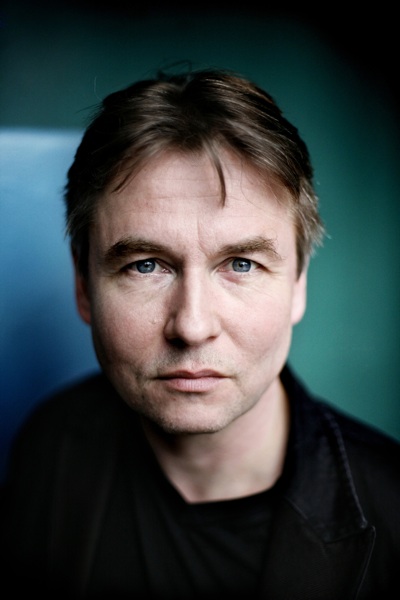A tale of social pressures and personal madness at Zellerbach
Famed Finish conductor and blossoming composer Esa-Pekka Salonen brought London’s Philharmonia Orchestra to Berkeley last week for a residency that included four different concerts, two interviews and a master class.
 On Thursday, Salonen’s own works were featured in a “composer portrait” at Hertz Hall, and included the Calder Quartet in Homunculus and internationally known pianist Gloria Cheng in Dichotomie. The next three evenings Salonen led the Philharmonia Orchestra for three very different programs, culminating in Mahler’s Symphony No. 9 on Sunday, a performance that garnered long standing ovations.
On Thursday, Salonen’s own works were featured in a “composer portrait” at Hertz Hall, and included the Calder Quartet in Homunculus and internationally known pianist Gloria Cheng in Dichotomie. The next three evenings Salonen led the Philharmonia Orchestra for three very different programs, culminating in Mahler’s Symphony No. 9 on Sunday, a performance that garnered long standing ovations.
Mahler’s final work, full of sarcasm and deep regrets, may have closed the door on the nineteenth century Romantics, but I think I preferred Saturday’s concert, Alban Berg’s chilling Wozzeck, opening the door on the poverty and social realism of the twentieth century.
Besides the Philharmonia Orchestra, the stage was filled with 25 members of the UC Berkeley Symphony, 60 singers of the UC Chamber Chorus, 25 members of the Piedmont East Bay Children’s Choir, and ten glorious soloists. Despite that crowded stage, Berg’s opera was a long cry from spectacle, with gossamer hues balancing muscled moments. In all, it was a carefully nuanced production, full of haunting gestures and devastating silences.
Over Berg’s score, of early Serialist impulses and vestiges of the late Romantic, soared the soloists, a remarkable group whom might more readily be found at the Vienna Staatsoper, La Scala or the Met.
Playing the captain, tenor Peter Hoare opened this un-staged version with gratifying bits of staging, adding mannerisms and physicality for a mesmerizing performance. His sly exaggerations would have fit the realm of a comic tenor, excepting for his vocal beauty and careful delivery. Sung in German, that delivery ranged from mocking to a not-so-subtle sexuality, thickened with moral ambiguities.
The object of his derision was Wozzeck, admirably played by baritone Johan Reuter. Standing at a sloppy attention, Reuter growled out low notes with occasional, and surprisingly tender, high passages.
Adapted from Georg Büchner’s play, Woyzeck, the off-putting characters were strangely compelling in their jealousies and downward spirals. In a word, Berg addresses a despicable view of the human condition, without the gloss of sympathy or empathy, and we are strangely moved. More importantly, he is describing a society’s madness— the grinding poverty that destroys a people.
The orchestration supplied an underlying anxiety, with upward movements, unresolved gestures, sharp horns, odd intervals, and harmonies with bite, a musical process that paints the roots of Wozzeck’s psychosis. Conceived just before World War I and finished in 1920, Berg brings to life that society-wide anxiety without resort to disorder. Rather, those dissonant tone rows are organized along rigorous lines, and one can readily analyze the formal structure, musical development, themes and leitmotifs.
Salonen organized his troops into a coherence that underscored the soloists. It would be easy to overplay that hand, but Berg is also excellent at framing the vocal lines, with textures that are transparent to the sung parts.
Angela Denoke sang the role of Marie, conveying a complex personality and contradictory fears and passions with notes of long purity. Her German was patently perfect, as she was able to convey scorn, fear and lust in every note, and capitalized on the moments of Sprechstimme (half-sung speech).
The libretto heightened that sordid mix of love and fear. She tells her boy he is a bastard “…and gives your mother so much joy with your wicked little face.” At bedtime she tells him, “The Sandman’s here. Close your eyes or he’ll make you go blind.” It reminded me of Japanese horror, with a sense of evil that passes from generations to generation.
The text has a stark and poetic quality, with bald conversations, bits of stream of consciousness, and heavy generalizations, all working to circumscribe our horizons and universalize the misery.
“Still, all is quiet, as if the world dead,” says Wozzeck.
“How red the rising moon is,” Marie sings. “The moon will betray me. The Moon is bloodstained.”
As Wozzeck descends into his hell, he becomes increasingly cryptic and poetic.
“Many people are near the door and don’t know it until they are carried through it feet first,” he intones ominously.
“I smell blood,” replies the Idiot.
The text and staging give the opera its force, but this mostly-concert version was a successful focus on the music’s starkly atonal beauty, and a testament to Salonen’s control of mood.
—Adam Broner
Photo of conductor Esa-Pekka Salonen, courtesy of the Philharmonia Orchestra.
The opportunity to hear a world-class orchestra is not as rare as once it was, thanks to the vigorous programming of Cal Performances, and during Matias Tarnopolski’s tenure, these visits have become a staple. At the end of this month, Nov 29 and 30, we will be blessed with a second residency, the Simón Bolívar Symphony Orchestra led by the young and fiery Gustavo Dudamel.
See calperformances.org for information on these and other concerts, including West African superstar Angelique Kidjo on Saturday, Nov 17 and the magical physicality of Mummenschanz Nov 23-25.
